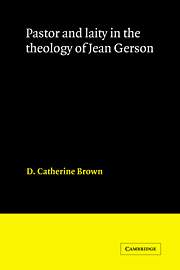Book contents
- Frontmatter
- Contents
- Preface
- List of abbreviations
- INTRODUCTION
- 1 GERSON'S LIFE
- 2 THE ART OF THE PREACHER
- 3 THE ROLE OF THE PASTOR
- 4 THE MEANS OF SALVATION
- 5 THE ANALYSIS OF SIN
- 6 THE MYSTICAL WAY
- 7 WOMEN, MARRIAGE AND CHILDREN
- 8 DOCTOR CHRISTIANISSIMUS ET CONSOLATORIUS
- Notes
- Bibliography of works cited
- Index
4 - THE MEANS OF SALVATION
Published online by Cambridge University Press: 20 October 2009
- Frontmatter
- Contents
- Preface
- List of abbreviations
- INTRODUCTION
- 1 GERSON'S LIFE
- 2 THE ART OF THE PREACHER
- 3 THE ROLE OF THE PASTOR
- 4 THE MEANS OF SALVATION
- 5 THE ANALYSIS OF SIN
- 6 THE MYSTICAL WAY
- 7 WOMEN, MARRIAGE AND CHILDREN
- 8 DOCTOR CHRISTIANISSIMUS ET CONSOLATORIUS
- Notes
- Bibliography of works cited
- Index
Summary
LATE MEDIEVAL NOMINALIST THEOLOGY: THE STATE OF THE QUESTION
In past and recent scholarship Gerson has generally been labelled as a nominalist theologian. He is characterised in this way, for example, by Oberman and some of his pupils in various works of the last few decades. It is not, of course, the older view of nominalism that these historians are working with. The traditional interpretation saw the movement, because of its anti-realist logic, as characterised by a rejection of metaphysics and natural theology, and sometimes by a thoroughgoing, almost Humean, epistemological scepticism. This meant that the realms of faith and reason were so separated that only a blind fideism and trust in revelation and the authority of the church could result. Further, the nominalist emphasis on the divine omnipotence and will, rather than on the divine intellect and reason, was thought to undermine the thirteenth-century ethical system of natural law, and to result in a moral order that was unstable and irrational because it depended only on the arbitrary will of God, who could have established and indeed still could establish an entirely different moral economy where present vices became virtues, and present virtues vices. The movement was held to have been very influential in the English, French and German universities during the latter Middle Ages, and its decadence was thought to have contributed to the coming of the Protestant Reformation. Thus, whatever the confessional position of the historian the movement was assessed in a negative way.
This interpretation of late medieval nominalism has undergone considerable revision recently as the works of more theologians have been studied, and the movement is now seen in a more positive light.
- Type
- Chapter
- Information
- Pastor and Laity in the Theology of Jean Gerson , pp. 79 - 115Publisher: Cambridge University PressPrint publication year: 1987

